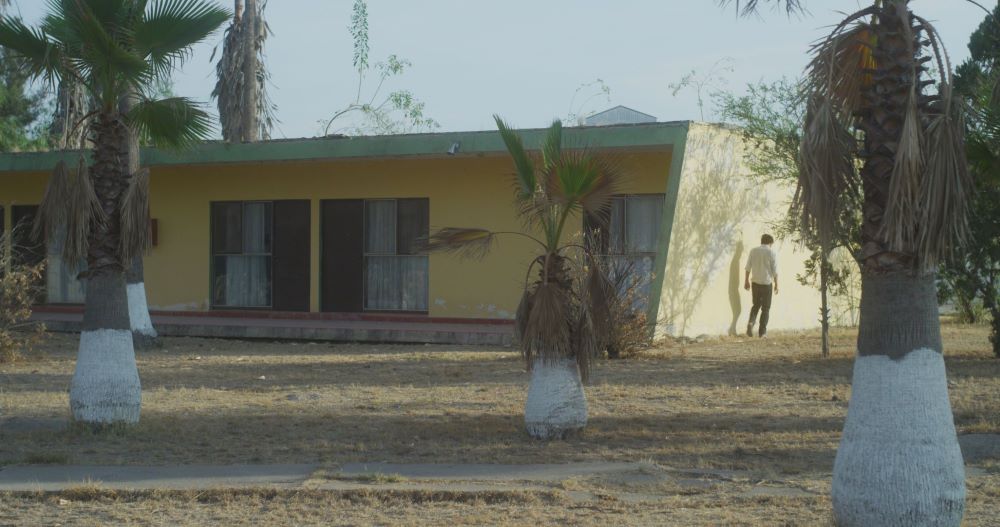Film Text: Fauna
Film Text: Fauna

Fauna in Six False Starts
By Becca Voelcker
1.
Nicolás Pereda’s ninth feature opens on a winding road in central Mexico. A couple are lost. –I’m not getting a signal. –I’ll reverse. Road signs point left, point right. The film’s tonal shifts will soon lead and mislead us. –You have arrived at your destination, announces the GPS. A barren mining town, off the side of the road. A night with his in-laws. A misunderstanding over a pack of cigarettes. A yellow paperback her brother is reading. –What’s it about? she asks. –A guy. He takes a drag of his cigarette. –A guy arrives in town looking for a man.
2.
Midway through Fauna, his latest film, Nicolás Pereda shuffles his regular cast of actors into new roles. A guy arrives in town looking for a man, who may already be dead. There’s talk of narcos and mining magnates. He meets a woman at his motel. We’ve seen her before, too—she played his sister. Now she’s another stranger in town, searching for her sister Fauna. She asks him to help her. They rehearse a scenario together. Pereda borrows from Cassavetes and Bergman. Fauna feels like snatches from a novella. Like everyone is an actor learning her lines or stealing another’s.
3.
Nicolás Pereda’s arid comedy-noir, Fauna, mines the everyday for awkwardness. Upon learning that his daughter’s boyfriend plays a bit part in a narco-themed television drama, a bafflingly indifferent father demands he re-enact a scene. The boyfriend shifts in his seat. –What, here? Now? The bar is shrouded in silence. –Go on. You’re an actor aren’t you. This, following an embarrassing introduction in which the boyfriend unwittingly bought the market’s last pack of cigarettes from the father for a significant mark-up. Fauna’s semi-improvised script captures family dysfunctionality in every stifled yawn and half-glance. Meeting in-laws rarely looked so strained, so hilarious.
4.
Following a decade working between fiction and documentary, the 39-year-old Mexican-Canadian filmmaker Nicolás Pereda has perfected an intriguing hybrid that embeds socio-political issues in quirky and quotidian narratives. Fauna, Pereda’s latest feature, studies the impact of narco culture on the popular imagination, and the combined damage that violence related to drug-trafficking, and natural resource extraction, inflict on Mexico’s ecological and social landscapes. The film flirts with thriller and noir genres, but thwarts explicit action in favour of undercurrents. Its narrative bifurcations create the feeling that we are stumbling through television dramas, learning a country’s history through these partial, peculiar vignettes.
5.
The McGuffin in the first half of Nicolás Pereda’s 2020 film, Fauna, is a pack of cigarettes. Even one cigarette will do—there’s a shortage in this eerie mining town. In the second half, there is a scarcity of towels. The resources the film circles above are actually buried underground, and hidden out of sight. The cigarettes and towels trigger more than awkward negotiations. They bring to light the film’s interest in issues of social and environmental justice regarding Mexico’s combined economies of mining and drug trafficking, the one undermining the land, and the other, prospects for a safer culture.
6.
–What happened? –It’s not clear. That’s how far I’ve gotten. We are speeding past miners descending to work in the night. Fauna, the eponymous character of Nicolás Pereda’s latest film, drives with a stranger who has come to town. The voices we hear are not theirs—not exactly. They belong to an earlier pair of characters played by the same actors. –Can I see the book? –You can keep it. Sometime you can tell me the ending. Suddenly, bifurcated storylines overlap. –Can I tell you something? It’s the brother’s voice. Come closer. On screen, Fauna leans in. The man whispers.
